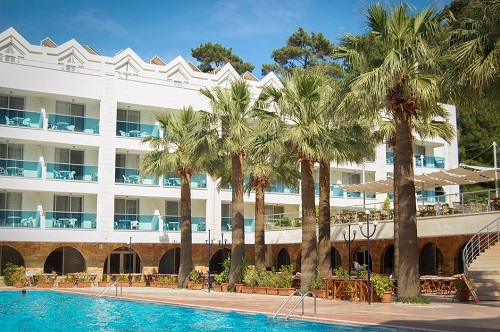
For 2018, Canada's hotel transaction volume is expected to fall short of last year's $3.5 billion, according to data from Colliers International. However, the group forecasts the total will meet the $2.3-billion average achieved between 2011 and 2017.
The average total price per room in the region reached $161,400 in 2017 while hotel values rose 13.2 percent. Colliers expects these values to grow 12.8 percent this year. “These healthy increases are due to a combination of relatively low supply of new hotel rooms and robust demand, as well as solid operational growth and resilient investor confidence in the sector,” Robin McLuskie, Colliers MD of hotels in Canada, said in a statement.
Canada scores $350 million in hotel sales in Q1 2018
The first quarter of 2018 has already seen 37 hotel transactions in Canada, reaching nearly $350 million in total sales. A few sales attributed to driving these numbers include Innvest Hotels' sale of a 12-property portfolio to a joint venture group established by Manji Holdings and Palm Holdings. However, the largest single asset sale of the quarter was the 218-room Extended Stay Ottawa Downtown, which sold to Paramount Properties for $48 million.
In the region, 43 percent ($1.5 billion) of 2017's total sales volume was strategic transactions—unique transactions with a pricing premium and a location in a high barrier-to-entry market. The $1.1 billion sale of the British Colombia Investment Management/SilverBirch Hotels & Resorts portfolio to Hong-Kong's Leadon Investment was the largest of these transactions. However, the highest number of transactions at 82 percent were traditional transactions with 131 in total.
Canada's stable political, economic climate attracts foreign investment
Foreign investment accounted for 43 percent of transaction volumes in 2017, reaching more than $1.3 billion. Colliers attributes the high foreign investment activity to Canada's stable political and economic climate. “Canada has benefited from a wave of cross-border capital looking for stable yields outside of their home borders, with 41 per cent of transaction volume between 2013 and 2017 attributed to cross-border sources of capital,” McLuskie said. “We expect purchases by foreign investors to moderate in 2018, principally due to the overall lack of large individual and portfolio transactions available for sale. In cases where there are long-term land plays as part of a sale, foreign investors will continue to be aggressive bidders.”
Pension funds, private equity, hedge fund groups to buy into Canada's hotels
Colliers predicts that current sellers—pension funds, private equity and hedge fund groups—will become buyers on offerings to gain yield and diversification. “Hotels generally provide superior risk-adjusted returns, averaging 210 basis points higher than other commercial real estate classes in the current cycle,” McLuskie said.
Manitoba expected to continue dominating in hotel sales
The region east of Manitoba is expected to hold on to its lead in sales activity, which attributed to 74 percent of national sales last year. Alberta and Western Canada energy markets are experiencing increased sales activity. Western Canada recorded a total of $123 million in hotel sales, attributing to 35 percent of the volume. The total rose from the $60.4 million recorded in the same period last year.
Canada is on track to significant hotel market growth
Colliers also predicts that Canada will see a 1.5- to 2.0-percent boost in its hotel market within the next three years thanks to its large hotel construction pipeline in both major urban areas and suburban markets. Montreal, Halifax, Ottawa, Calgary and Edmonton are expected to drive this hotel growth in 2018.
In Vancouver, Toronto and Montreal, demographic preferences and cost competitiveness are driving growth in the boutique and lifestyle hotel sectors. Colliers expects this to continue through hotel conversions, renovations and new-build properties. “These operations either are new construction developments or in most cases repositioned older hotel properties that were in need of renovation capital, and owners are adapting the room product and amenity offering to cater to an increasingly new customer that is searching for more lifestyle and boutique offerings,” McLuskie said. “Since they are typically smaller hotels, they are easily absorbed in the market and provide a unique and new alternative for the corporate or leisure traveler.”
Notable conversions from this year include Toronto's The Anndore House, which opened recently, and the Exchange Hotel Vancouver, which is slated to open later in 2018. Meanwhile, a set of 13 hotels were sold in a $143-million deal for redevelopment or conversion into alternate properties in 2017. The next hotel conversion will be Paramount's Extended Stay Downtown Ottawa. The group acquired the property earlier this year to convert it into rental apartments. “The redevelopment component of the market has been limited, but opportunities can be found for older hotel product that is ripe to come out of inventory and convert to other uses such as residential condominiums and student or rental housing, particularly in the major markets of Toronto, Vancouver and Montreal,” McLuskie said.










Service Hotline
Work Time:Mon-Fri 9:00-18:00
UTC+8

Sinoexpo Digital Platform
Copyright 2006-2024 Shanghai Sinoexpo Informa Markets International Exhibition Co., Ltd. All rights reserved
沪ICP备05034851号-77
 沪公网安备 31010402000543号
沪公网安备 31010402000543号